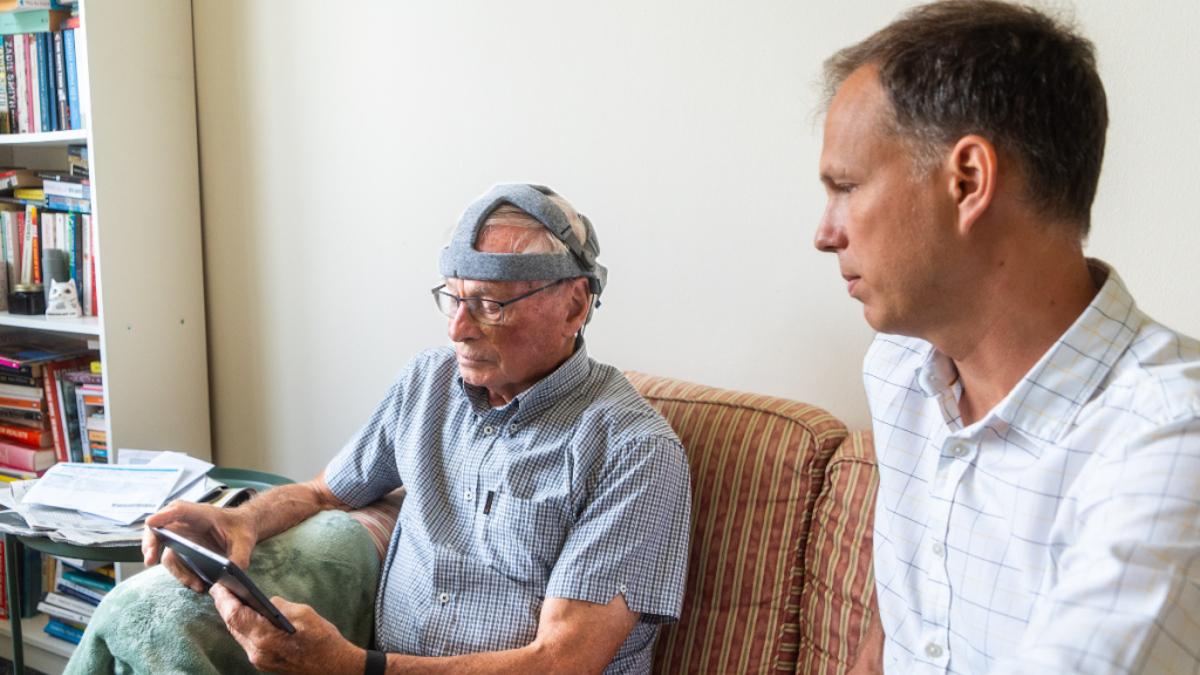Health
New Test Offers Hope for Early Detection of Dementia

Researchers from the UK have developed a promising three-minute test that may significantly advance the early diagnosis of dementia. Known as the Fastball test, this innovative method assesses individuals’ cognitive abilities and can detect signs of cognitive decline potentially years before traditional diagnostic approaches. The study, conducted by a team from the Universities of Bath and Bristol and led by cognitive neuroscientist Dr. George Stothart, aims to identify those at risk of developing dementia, particularly focusing on conditions such as Alzheimer’s disease.
The Fastball test requires participants to wear an electroencephalogram (EEG) headset while they view a series of images displayed on a screen. The test evaluates the brain’s capacity to differentiate between images based on prior exposure. In a recent clinical study involving 33 participants with memory deficits, 20 individuals with cognitive issues unrelated to memory, and 54 healthy adults, the results showed that those diagnosed with amnestic mild cognitive impairment (MCI) exhibited significantly lower responses compared to their healthier counterparts.
Potential for Earlier Intervention
The significance of this test lies in its ability to identify memory issues in individuals with mild cognitive impairment, a condition that often precedes Alzheimer’s. Individuals with amnestic MCI are at a higher risk of developing Alzheimer’s, and the early detection of memory decline could facilitate timely intervention with emerging treatments like Leqembi (lecanemab) from Eisai/Biogen and Kisunla (donanemab) from Eli Lilly, both of which target the amyloid plaques associated with the disease.
Dr. Stothart emphasized the urgent need for tools that can identify Alzheimer’s earlier, stating, “We’re missing the first 10 to 20 years of Alzheimer’s with current diagnostic tools. Fastball offers a way to change that – detecting memory decline far earlier and more objectively, using a quick and passive test.”
While the findings are promising, the authors caution that further research is needed before the Fastball test can be widely implemented in clinical settings. They suggest it has the potential for broader screening and monitoring, which could be adapted for use in general practitioner surgeries, memory clinics, or even at home.
Expert Opinions and Future Steps
Commenting on the study, Prof. Vladimir Litvak from the UCL Queen Square Institute of Neurology, who was not involved in the research, acknowledged the test’s potential but noted that it does not yet qualify as a clinically useful tool. “The study found a clear difference in EEG responses between patients with and without amnesia. However, the ability to classify individual patients using this effect, including estimates of error rates, was not assessed,” he explained.
Prof. Litvak pointed out that all participants were already symptomatic, highlighting the need for prospective studies to determine whether the Fastball test can predict an individual’s clinical progression and aid in treatment stratification.
Earlier in 2023, the FDA approved the first blood test to help diagnose Alzheimer’s, which has reportedly increased the usage of anti-amyloid therapies. Additionally, various experimental methods are being explored for early dementia detection, including AI-enhanced eye examinations, virtual reality navigation assessments, and tests based on sensory responses, typing, and driving patterns.
As the scientific community continues to seek effective early detection strategies, the Fastball test represents a significant advancement in the quest to understand and combat dementia, offering hope for millions at risk of cognitive decline.
-

 World2 months ago
World2 months agoCoronation Street’s Shocking Murder Twist Reveals Family Secrets
-

 Entertainment2 months ago
Entertainment2 months agoAndrew Pierce Confirms Departure from ITV’s Good Morning Britain
-

 Health5 months ago
Health5 months agoKatie Price Faces New Health Concerns After Cancer Symptoms Resurface
-

 Health2 weeks ago
Health2 weeks agoSue Radford Reveals Weight Loss Journey, Shedding 12–13 kg
-

 Entertainment6 months ago
Entertainment6 months agoKate Garraway Sells £2 Million Home Amid Financial Struggles
-

 Entertainment5 months ago
Entertainment5 months agoAnn Ming Reflects on ITV’s ‘I Fought the Law’ Drama
-

 World3 months ago
World3 months agoBailey Announces Heartbreaking Split from Rebecca After Reunion
-

 Entertainment2 months ago
Entertainment2 months agoDavid Jason and Nicholas Lyndhurst Eye Reunion for Only Fools Anniversary
-

 Entertainment3 months ago
Entertainment3 months agoCoronation Street Fans React as Todd Faces Heartbreaking Choice
-

 Entertainment2 months ago
Entertainment2 months agoBradley Walsh Sparks Strictly Come Dancing Hosting Speculation
-

 World3 months ago
World3 months agoEastEnders’ Nicola Mitchell Faces Unexpected Pregnancy Crisis
-

 Entertainment2 months ago
Entertainment2 months agoTwo Stars Evicted from I’m A Celebrity Just Days Before Finale





















